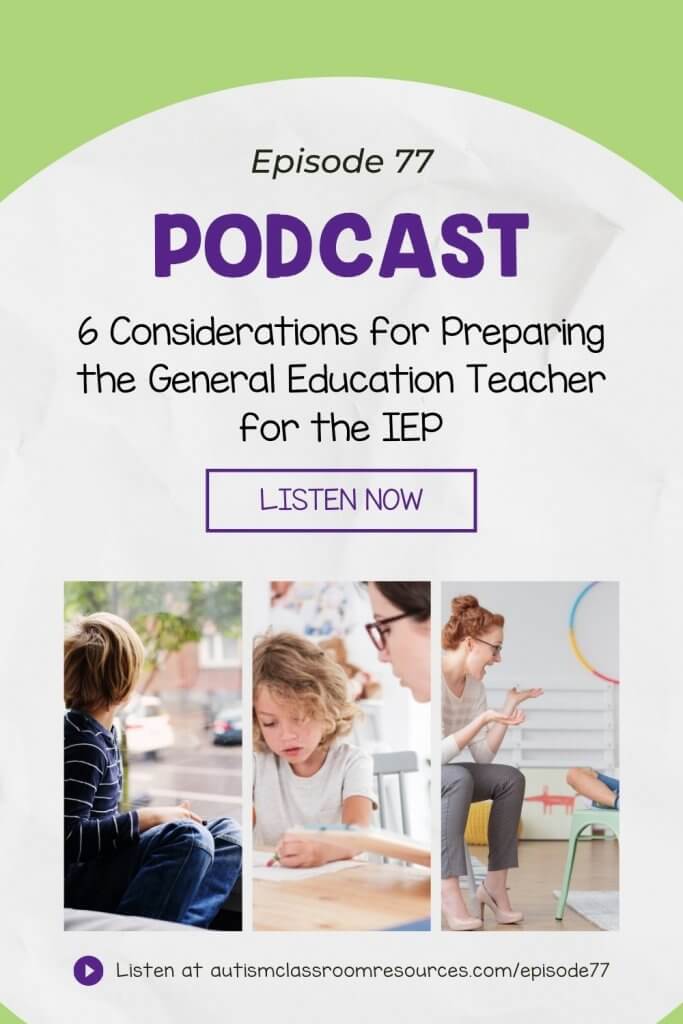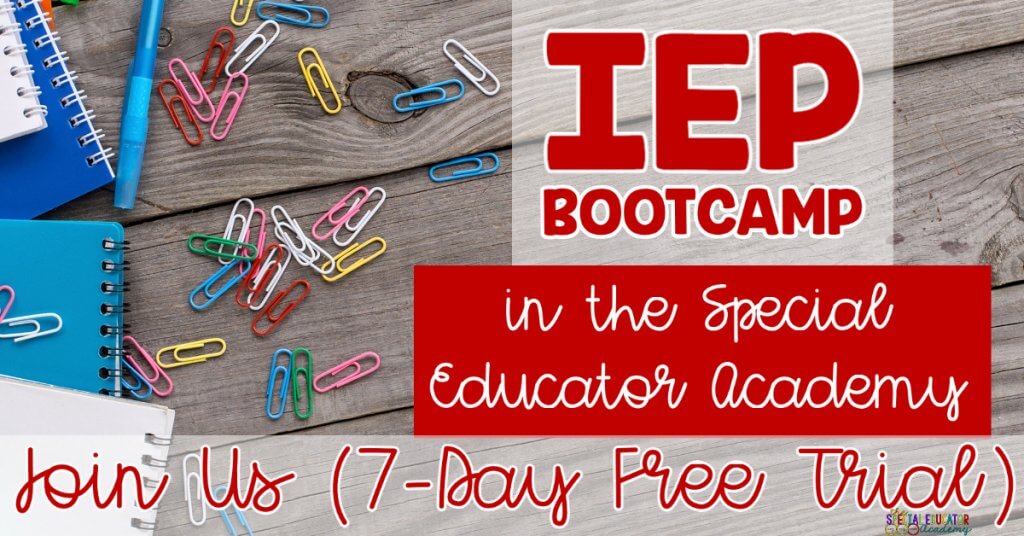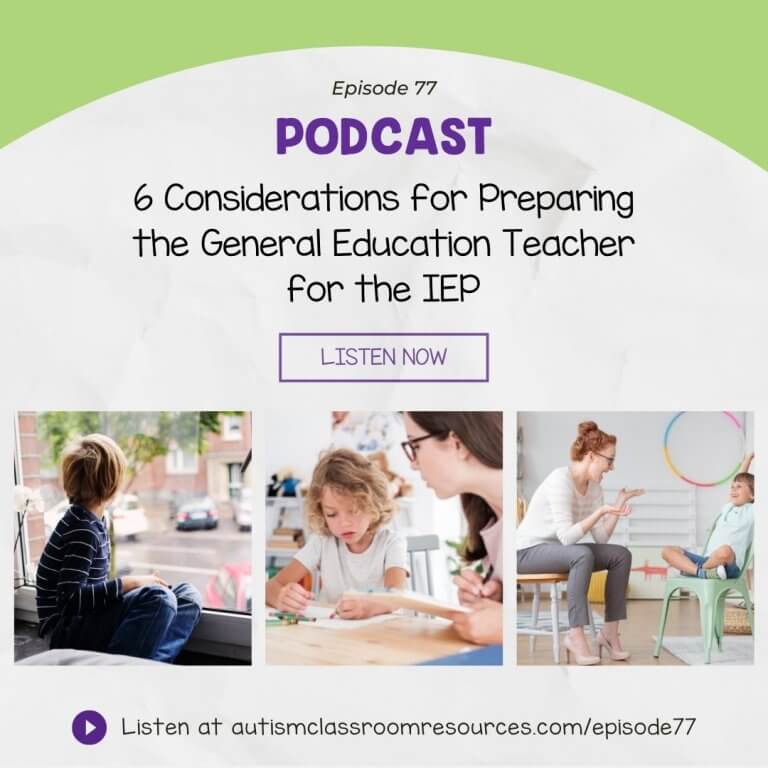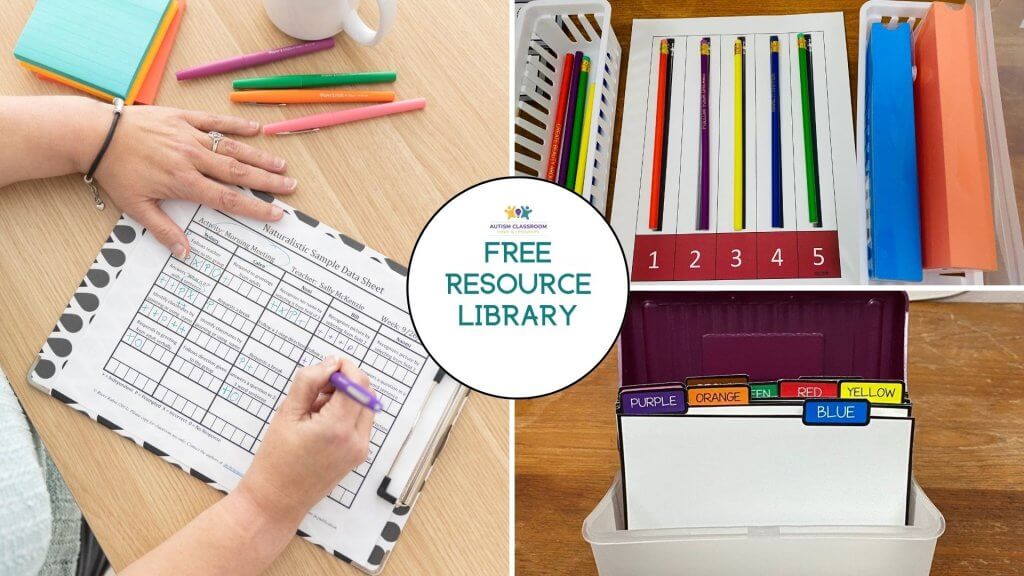Welcome to the Autism Classroom Resources Podcast, the podcast for special educators who are looking for personal and professional development.
I’m your host, Dr. Christine Reeve. For more than 20 years, I’ve worn lots of hats in special education, but my real love is helping special educators like you. This podcast will give you tips and ways to implement research-based practices in a practical way in your classroom to make your job easier and more effective.
Welcome back to the Autism Classroom Resources Podcast. I am very glad that you’ve joined us today. I’m Chris Reeve, and I’m your host. And this week we’re continuing to talk about IEPs and specifically about IEP meetings. And so my question this week is have you ever wondered about the role of a general education teacher in an IEP meeting when the students have very significant disabilities? I’ve sat through a lot of IEPs in my career as a consultant and administrator, a behavior specialist, lots of different things. And we all know that the general ed staff is required to be a part of the IEP team. We have to have a general ed teacher there. And sometimes that gen ed teacher fits seamlessly into the team and everybody feels real good about it, but sometimes they really struggle with what their role is. And sometimes people feel like, well, they’re not really needed in this IEP. So they can just come in and sign the paper and then they can go.
And I have a real problem with that. And don’t get me wrong. I know that everybody has a lot going on and I know that IEP meetings can take up a lot of time. But many, many times when I work with students who are self-contained, I see people dismissing general ed teachers and they’re not really a meaningful part of the meeting. And that just doesn’t work for me because my thought is, if we have to do it, let’s make it functional. And it also doesn’t work for me because I think that there’s a lot that the general ed teacher can bring to that meeting that is really meaningful and functional for that team.
But it is very possible that the general ed teachers had really limited experience and probably less formal training on what their role in the meeting should be. And for students who are full time or close to full time in gen ed, then it’s really pretty easy to see what that role would be. But for students who spend limited time in the general ed classroom, I think we really have to think about what we expect of the general educator. And I think as special educators, we need to work to prepare our general educators how to actively participate in the meeting. And depending on the student, there are tons of things that gen educator brings to the IEP meeting.
So that is what I want to talk about today. You can find a transcript and information for this blog post at autismclassroomresources.com/episode77. And if you’re looking for more ideas and guidance on writing IEPs for all different types of students in special ed, come and join the Special Educator Academy where next month we are starting our IEP bootcamp study group, which is all about writing everything from the present level from assessment all the way through the goals and objectives and even into how do we implement this in the classroom. And you can get more information about that as well as a seven day free trial at specialeducatoracademy.com. So let’s get started.
The first thing that we need to consider as we prepare general ed teachers for IEPs is we need to let them know the purpose of the meeting and what is going on. Number one, the biggest thing is to make sure that the general educator who is coming to the meeting knows the student. I’ve actually been in IEPs where this isn’t true and it is not a fun experience. Pulling a random general educator into the meeting just because they have a general education certification does not make sense. You want to make sure that the person that you have in the meeting can talk about the student and who they are, what they need, and all those kinds of things. So make sure that you’ve got somebody who knows the student. I know that seems like it would go without saying, but trust me, it doesn’t.
If you need to help them think about what they can talk about with the student about the student in their classroom or observations of the students in other parts of the school, but also make sure that you fill them in on any potential problems that you might be expecting in the IEP, any issues. Give them a heads up. Let them know about any concerns that you’re aware of that might come up. So if you know that the parents are concerned about issues with peers or issues with the curriculum or communication with the general ed teacher, let them know about that and don’t let them get hit in the head with it when they walk into the IEP because it might be the first time they’re hearing about it if they aren’t the person who is the primary communicator with the family.
You also want to make sure that they are aware and understand what the IEP is, how the IEP process works, all that kind of thing and what their role is and what they’re there for. So I think that is… For some of our general educators, we may need to do some of those basics as well. Many of them I think in this day and age may know that already, but you may just want to double-check, especially if they’re a newer teacher.
Another thing that I think we can do to help them prepare is to really help them see that they have an amazing scope of expertise and knowledge that they can share with the IEP team. They have knowledge of the curriculum. They have the deep level knowledge about the grade level skills and requirements that a lot of times as special educators, we don’t have because we’re teaching all different grade levels at the same time. Can they talk about how the student is accessing the curriculum in their classroom? Or might it be better for them to talk about how they’re accommodating or modifying the curriculum in their classroom? Perhaps it makes more sense for them to discuss how the curriculum is implemented in their classroom and how they teach in order to give families an idea of what it might look like for this student. That might be really important if they’re the grade level that the student is transitioning to in the coming year.
Just be careful that they aren’t presenting it as a fait accompli, that all the students in my class have to be able to sit for this amount of time or do this. And if they can’t do that, then they wouldn’t be eligible to come to my class. You just want to make sure that you’re not falling into that kind of situation where they’re making it sound like a student wouldn’t be able to come if they didn’t meet that, but they are the best person to talk about what the room looks like, what the curriculum looks like, what the situation looks like in their classrooms. So they are really helpful that way. And they also are the person who can talk about what the curriculum looks like in that grade level. And that can be a really useful perspective to have in the IEP meeting.
Another thing that you could help them prepare for is to talk about social opportunities that might be available or social observations that they’ve made of this particular student. Our students with autism and many of our other special ed students benefit from opportunities to interact with their same age peers to learn social skills or just for fun interaction, and often parents really want to know how their kids are getting along with the kids in their class. So the initial approach might be for them to go to specials or lunch or recess, but for many of our students, especially our students with autism, they might do better to go into an academic center where it’s not as loud and it’s more structured and they can excel at something that they have a strength in.
For instance, I’ve had some students with significant disabilities who bring adapted books into the classroom and peers and students with disabilities read together. And that means that we have to have a time that the students in the classroom are not engaged in their instructional time and the general educator is the person who knows what the day looks like. Typically, he knows what both his grade and the next grade up are going to look like and how the classes are structured and what opportunities might be available for doing that. And that becomes important when we’re thinking about planning. So you’re not going to create the student’s whole schedule in the IEP meeting obviously, but you are going to be thinking about some skills and how they be eventually addressed. So the general ed teachers are the ones who are going to have that knowledge of what those classes look like and how those opportunities might fit in best. And that’s something you can help them think about ahead of time to share with the team.
Another area you can prepare them to talk about is that the general education teacher is the one who really can talk about what typical grade level, second graders, third graders, high schoolers look like. How long are they expected to sit in a group? How much new information can they take in and be expected to retain? That’s important information for them to be able to share with the IEP team. We always want to be teaching to the next environment. So what are the realistic expectations for a student of that age? What are the skills that we need to be thinking about? Putting on the IEP to help the student to be ready for that next environment, that’s something that we can get from that general ed teacher.
Another way that we can prepare them, and often they come very prepared themselves is to really take advantage of their instructional expertise. Many of our students, there may be an area that they may be able to bring to the table that we may be struggling with. I was really excited to sit in an IEP meeting once with a student who is learning fractions and her special ed teacher, who was a generalist of all areas and ages, knew how to teach math, but she was really stuck with this level of math with this particular student. She just was having problems figuring out how to present it in different ways that this student was really able to learn. And the gen ed teacher was able to describe how students learn fractions. And he shared multiple ways that we could demonstrate and teach them so they would make sense for this particular student. He was a huge asset for both the teacher and the IEP team in writing this student’s math goal.
So seek out that expertise, recognize it and ask them to share. Special educators are typically teaching up to six grade levels at a time. Being a master of every single skill is difficult. The teachers who are specializing in their grade level are going to be able to go deeper into the instructional content. So ask them to share that with the team. It’s going to be a benefit for everybody.
And finally, one of the things that is really helpful for families is for general educators to be able to tell who would be potential friends for this child? Who would be potential buddies for socialization opportunities, for play dates, for parties? They’ll know who they’re getting along with, but also who might be good models? They’re going to know the students with special needs. We talked about that at the beginning, they’re going to know the students in their classrooms. So they’re going to be able to figure out who’s a good mix. And that can be really critical in helping to brainstorm ways to integrate more social opportunities into their day.
So there’s lots of things that we can work with general educators to integrate them as a critical part of the fabric of the IEP team. And I think it’s really important that we do that. That we don’t just check them off our list and dismiss them from the meeting. I recognize there may be times that they’re not going to be able to stay the whole time, but if we can please get this from them when they are there, I think that that is a critical function that they serve.
So I hope that this has given you some really good ideas. I hope it’s given you some things to think about. I would love to hear from you about how you integrate your general education professionals into your IEP meetings and what goes on in your classroom. So if you’re an educator, hop over to our free Facebook group at specialeducatorsconnection.com and answer the three questions and we’ll get you in and we would love to have you as part of our discussion. Thank you again for everything that you do for your students. Thank you for tuning in today. And I hope to see you again here next week.








